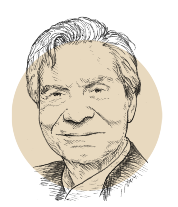France-Amérique: You invented the now-renowned abortion pill in the early 1980s. What did it change?
Etienne-Emile Baulieu: This pill is used to terminate a pregnancy in the first days or weeks of gestation. A medical drug respects a woman’s privacy, is cheaper, and is a way to act as soon as possible after the fertilization of the egg. Avoiding surgery, which is inevitably invasive, reduces all the disadvantages of hospitalization. However, for certain pro-life campaigners, a safe method that facilitated abortions was seen as likely to increase their numbers. This shows an extremely contemptuous attitude toward women. And there have been no increases, neither in France nor in the United States! France was very slow to authorize contraception; the contraceptive pill was only made available to French women in 1968, and abortions were then only made legal in 1975 following bitter debates. When RU-486 was developed, modifying the law to authorize a pill taken at home was out of the question. Its use was therefore included in the legal framework for abortions. I would have wanted this pill to be taken the day after unprotected sexual relations – what the Americans call the morning-after pill or Plan B.
The approval of the RU-486 pill was the result of a brutal battle in the United States – you were personally threatened by pro-life activists. Today, this fight has resumed. Among the wave of bans on surgical abortions, several states are now also looking to outlaw the abortion pill. Are the opponents the same?
Yes. All studies on the subject show that half of all abortions in the United States are now carried out using RU-486 instead of surgery. Opponents of this pill are actually those who are against abortion, generally for religious or ideological reasons. Some are even hostile to any form of contraception. The explanation for this is found in everyday male chauvinism. It is always tragic when politics takes the most vulnerable hostage – in this case, women. The clash between pro-life and pro-choice in America is highly biased. I have never been “for abortion,” but rather “for the right to abortion.” I support life and women’s right to choose.

How did you develop this pill? Was it a lucky coincidence or the result of systematic research requested by a laboratory?
This pill was neither down to luck nor to a laboratory commission. I was working on hormones and was exploring ways to terminate a pregnancy as early as possible. I had become close with Gregory Pincus, the American biologist who invented the contraceptive pill in 1955, a great scientist who has since been forgotten. My laboratory [in the Gregory Pincus Building at the Bicêtre Hospital south of Paris] is actually the only one in the world to be named after him. But while the contraceptive pill changed women’s lives, it was not enough. We can’t always predict a romantic encounter a month in advance! I developed a way to prevent the implantation of a fertilized egg using an anti-hormone, and we created an anti-progesterone pill to counter the effects of this pregnancy hormone.
You almost spent your career in the United States, but you eventually chose to return to France. What motivated your decision?
I had familial, cultural, and psychological reasons for choosing to return to France, despite the fact that I had job offers in the United States, which is where I had completed part of my studies in the early 1960s. My medical career was almost mapped out for me. But practicing medicine is very different from country to country, and France suited me perfectly at the time.
Are there any differences between medical research in France and in the United States?
Scientific research, particularly in medicine, is unfortunately sorely underfunded in France, and we do very little to retain the best of the younger generations – the infamous brain drain – or attract them. We therefore run the risk of compromising our national independence, which is increasingly at the mercy of economic and business pressures. What’s more, our young scientists tend to be discouraged. Whether behind a lab bench or in front of a computer, they lose faith in the future. Ten years after graduating from high school, having completed a doctorate and worked abroad once or twice, they find themselves in their thirties being offered temporary contracts paid 2,000 euros a month. And that’s the best-case scenario! This makes it impossible to even rent a small room, and banks refuse loans to those with such erratic career paths. I am often slightly ashamed to welcome young researchers and international scholars, as many of our laboratories are old and poorly managed due to a lack of financing. By contrast, in the United States, there is a real recognition of research and researchers, along with innovations and new treatments.
Your new cause is the fight against aging through medical solutions. What are they? Is aging a disease? Some in the United States even believe that death is a disease. Where do you draw the line between medical research and science fiction?
Aging is a process of change defined both by human nature and the medical and social possibilities of each era. The result of which is the potential to live longer and in better health. Yes, there are ways of influencing this process and we should continue developing them to prolong lifespans, but there is a limit. I do not believe in science fiction in this field. My current work in aging is an original approach to tackle Alzheimer’s disease, and more generally senile dementias, focused on a protein discovered in my laboratory. My attitude is that we should work to keep extending life and life expectancy. But the most important thing is to preserve optimum brain function in order to live as long as possible in full possession of our faculties.
Interview published in the July 2022 issue of France-Amérique. Subscribe to the magazine.












